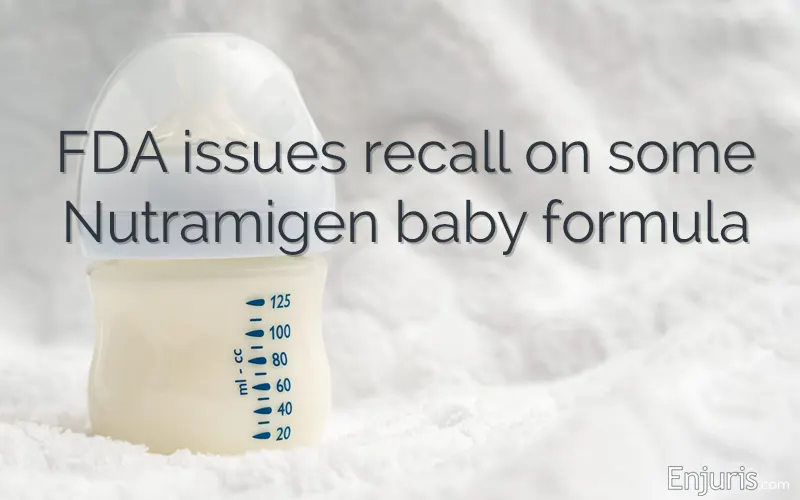
Neither parents nor the medical community were warned that Enfamil increases the risk of necrotizing enterocolitis
Although the American Academy of Pediatrics (AAP) and the American Academy of Family Physicians (AAFA) recommend breastfeeding for the first six months of an infant’s life, many parents are unable or simply choose not to breastfeed.
The Centers for Disease Control and Prevention (CDC) reports that more than 83 percent of newborns are fed some breast milk shortly after birth, but that number drops to 55.8 percent by the time they turn six months old.
Babies who do not receive their nutrition from breast milk typically receive it through formula. Enfamil is one of the most popular brands of baby formula, along with Similac.
The United States Food and Drug Administration (FDA) regulates baby formula sold in the United States, but there have nevertheless been lawsuits filed against the manufacturer of Enfamil due to some serious side effects.
What is Enfamil?
Enfamil is a brand of infant formula made by Mead Johnson (a subsidiary of Reckitt).
Enfamil was first put on the market in 1959. The product was marketed as “the nearest approximation of mothers’ milk” for the “physician who prefers a lower protein formula than most infant formulas.”
Since the release of Enfamil in 1959, Mead Johnson has added several different versions of Enfamil to the market (including Enfamil NeuroPro EnfaCare and Enfamil Enspire), all with slightly different ingredients.
Like other brands of baby formula, Enfamil formula is made using cow’s milk. It’s intended to be a substitute or supplement to breast milk.
How to make a bottle using baby formula
The Mayo Clinic recommends taking the following steps to prepare a bottle using infant formula:
- Check the expiration date. Make sure the formula has not expired.
- Wash your hands. Make sure your hands are washed and dried thoroughly before preparing the formula.
- Prepare your bottle. You should sterilize your bottles, nipples, caps, and rings before using them for the first time. You may want to consider sterilizing your bottles and accessories before each use if your baby is younger than three months, was born prematurely, or has a compromised immune system.
- Add water. If you’re using liquid-concentrate or powdered formula, you need to add clean water. Follow the manufacturer’s instructions for how much water to use. Your baby might not get the nutrition they need if you use too much water. On the other hand, not using enough water might cause your baby to become dehydrated.
- Measure the formula. Carefully measure the amount of formula to add based on the manufacturer’s instructions.
- Warm the formula (optional). You can warm the formula if your baby prefers warm formula. To do so, place a filled bottle in a bowl of warm water and let it sit for a few minutes.
- Store formula safely. Cover and refrigerate any unused formula from a freshly opened container. Discard any leftover formula that’s been refrigerated for more than 48 hours.
Does Enfamil cause necrotizing enterocolitis (NEC) in newborns?
A number of lawsuits have been filed by parents against Mead Johnson, claiming that:
- Enfamil causes NEC,
- Enfamil caused their child’s NEC,
- Mead Johnson knew or should have known that Enfamil causes NEC, and
- Mead Johnson failed to warn parents and medical providers that Enfamil causes NEC
Before we address the question of whether Enfamil causes NEC, let’s take a closer look at the condition.
According to the Cleveland Clinic, necrotizing enterocolitis (NEC) is a gastrointestinal condition that primarily affects preterm babies. Roughly 9 percent of newborns are born prematurely in the United States. NEC inflames intestinal tissue, causing it to die. As a result, a hole may form in the intestine of a newborn with NEC. Bacteria can leak into the abdomen or bloodstream through this hole.
Symptoms of NEC include:
- Abdominal distension
- Diarrhea
- Inability to digest food
- Lethargy
- Vomiting
- Temperature instability
NEC is a serious condition with a death rate approaching 25 percent. Infants suspected of having NEC are fed via intravenous fluid and given antibiotics. Surgery may be necessary if there’s a hole in the intestines. Some babies fully recover from NEC, while others have lifelong neurological and nutritional complications.
So, does Enfamil cause NEC?
As far back as 1990, a study published in the peer-reviewed journal Lancet found that NEC was six to ten times more common in exclusively formula-fed preterm babies than in those preterm babies fed breast milk exclusively.
In 2011, the U.S. Surgeon General published a report titled, “The Surgeon General’s Call to Action to Support Breastfeeding.” In the report, the Surgeon General warned that “for vulnerable premature infants, formula feeding is associated with higher rates of necrotizing enterocolitis.”
Subsequent studies have reached a similar conclusion. In 2016, a study published in the Journal of Pediatrics found that premature babies who consumed cow’s milk-based formula (such as Enfamil and Similac) were more likely to develop NEC than those who consumed only breast milk.
Specifically, researchers found that low-birth-weight infants who consumed breast milk at least 98% of the time had a 1.3% occurrence rate of NEC. When low-birth weight infants had only formula, they had an 11.1% occurrence rate of NEC. Babies who had a combination of breast milk and formula had an 8.3% occurrence rate.
Researchers aren’t certain why premature babies who consume formula are more likely to develop NEC. The prevailing theory is that premature infants have intestines that can’t protect themselves as well as the intestines of more developed infants. While human milk adds protection (reducing inflammation and bacterial invasion), formula encourages the proliferation of bacteria.
Has the FDA recalled Enfamil?
The FDA has not recalled Enfamil even though its packaging does not contain any warning labels about the increased risk of NEC among premature babies.
There have been some isolated store recalls, but these recalls were the result of product tampering. For example, a store recall occurred after a handful of mothers reported that their Enfamil products contained flour instead of formula.
Enfamil lawsuit update
The link between baby formula and NEC is strong enough that the AAP (along with many other health organizations) strongly recommends giving premature babies breast milk whenever possible.
So if health organizations are advising against giving premature babies formula due to the risk of NEC, why isn’t the manufacturer of Enfamil required to warn parents and doctors about the risk? This is precisely the question some parents are asking in their lawsuits against Mead Johnson.
William Peebles lawsuit against Mead Johnson
On September 20, 2022, William Peebles filed a wrongful death lawsuit against Mead Johnson.
William’s daughter, Lillian, was born prematurely, at 27 weeks gestation, at the Woman’s Hospital in Baton Rouge, Louisiana, on June 21, 2009.
Lillian developed NEC after being fed Enfamil while in the Newborn Intensive Care Unit (NICU). She died on July 20, 2009.
The wrongful death lawsuit filed by William alleges that Mead Johnson:
“promotes the use of its preterm infant cow’s milk-based products to parents, physicians, hospitals, and medical providers as safe products... despite the knowledge of the significant health risks posed to preterm infants... including the significant risk of NEC and death.”
What’s more, the lawsuit alleges that Mead Johnson “did not provide any warning in its labeling, websites, or marketing that warns that its cow’s milk-based products exponentially increase the risk of NEC and death in preterm infants.”
The lawsuit is still pending.
The NEC lawsuits are not the only lawsuits Mead Johnson has faced. Mead Johnson recently settled a class action lawsuit for $8.4 million. The lawsuit alleged that Mead Johnson inflated the number of bottles its Enfamil baby formula products could make.
We’ll do our best to keep you updated on the Enfamil lawsuits. In the meantime, learn more about unsafe baby foods and product liability lawsuits.
FDA Recalls Baby Formula
Nutramigen baby formula suspected of contamination with dangerous pathogen. Here’s how to protect your baby.
See our guide Choosing a personal injury attorney.
Personal injury law basics
What is personal injury? Common questions answered. Accident & personal injury case/claim basics: read about money, insurance, liability, negligence, timing, lawsuit, settlements. Read more
What are the time limits for personal injury compensation claims?
Generally, from 1-6 years, most commonly 2 years, starting from the time you were injured. Read more



